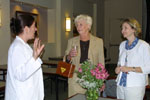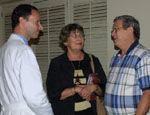Awareness shapes attitudes to deadly disease
by Cindy AbolePublic Relations
The numbers don’t lie.
In this year alone, an estimated 157,200 Americans will die from lung cancer. The harsh reality is that this form of cancer continues to be the leading cause of cancer-related death among both men and women.
A finding first reported in a 1982 U.S. Surgeon General’s report confirms that lung cancer continues to kill more people than breast, prostate, colon, pancreas and ovarian cancers combined within the United States.
But as the number of people afflicted with lung cancer continues to rise, new efforts in awareness, improvements in treatments and patient care options, plus effective screening methods may help reduce the number of people diagnosed with lung cancer.
Each year in November, Americans are reminded about the negative and often fatal effects of smoking and lung cancer. November is National Cancer Awareness Month. It is also the same time of the National Cancer Society’s Great American Smokeout, an event held on the third Thursday of November to promote tobacco awareness. To celebrate this year’s awareness, clinical staff coordinated a Lung Cancer Awareness Program for patients and clinicians held Nov. 12 at Gazes/Thurmond Research Building.
 Nursing
student Suzanne Keith, left, joins Lillian Dodson and HCC's Susan Keller
in a discussion. The event was coordinated by nurses/patient-educators
Andrea Maeburn and Karen Rankine.
Nursing
student Suzanne Keith, left, joins Lillian Dodson and HCC's Susan Keller
in a discussion. The event was coordinated by nurses/patient-educators
Andrea Maeburn and Karen Rankine.
The half-day program featured talks from physicians, health care specialists and nursing educators. Also featured was a candid talk by Charleston native and lung cancer survivor Lillian Dodson.
The event was made possible by a grant from the Lowcountry Chapter of the Oncology Nursing Society. The society awards grants on an annual basis to support lung cancer education and awareness within local communities.
 Cardiothoracic
surgeon, Dr. Mark Block chats with some lung cancer awareness program participants
on Nov. 12.
Cardiothoracic
surgeon, Dr. Mark Block chats with some lung cancer awareness program participants
on Nov. 12.
“Lung cancer awareness month is very important,” said Mark Block, M.D., assistant professor of medicine, cardiothoracic surgery, was one of the event’s speakers. “It attracts attention to a disease whose issue, because of various reasons, seems misunderstood among the general populace. Lung cancer lacks in enough interest and public attention compared to the level of advocacy and support of other specific cancers and diseases.”
Last summer, MUSC joined more than 30 other medical institutions as a study site for the National Cancer Institute’s National Lung Screening Trial (NLST). The research study is one of the nation’s most comprehensive screening trials aimed at reducing the number of lung cancer deaths through effective screening techniques.
The study targets men and women, between the ages of 55 to 74, who are current or former smokers who are at risk for developing lung cancer. Potential participants answer health-related questions and undergo screening tests that are designed to detect lung cancer at an earlier stage.
The NLST is designed to evaluate and compare current testing methods: chest X-ray and the spiral computed tomography (CT) scan, a method that can locate tumors smaller than one centimeter in size. Of the nearly 400 participants already enrolled in the study, only a small handful have been diagnosed with lung cancer.
The 55-year-old Dodson was a long-standing smoker who benefited from screening and treatment— first, as a participant in the NLST and then, as a HCC patient.
“Lung cancer continues to be the leading cause of cancer death in South Carolina,” said James Ravenel, M.D., assistant professor of radiology and local principal investigator for the study. “There’s been much controversy about the effectiveness of the chest X-ray and CT scan as screening methods. Obviously, we’re not just focused on early detection, but patient follow-up and at what specific intervals. Our involvement in this study is a tremendous opportunity for clinicians and researchers to learn about lung cancer detection using the CT and its overall significance.”
The NLST is actively seeking study participants until early 2004. For information, call 792-1414.
Can quitting really help a lifelong smoker?
It is never too late to quit. The sooner smokers quit, the more they
can reduce their chances of getting cancer and other diseases. Within 20
minutes of smoking the last cigarette, the body begins to restore itself.
- After 20 minutes: Your blood pressure drops to a level close to that before the last cigarette. The temperature of your hands and feet increases to normal.
- After 8 hours: The carbon monoxide level in your blood drops to normal.
- After 24 hours: Your chance of a heart attack decreases.
- Within 3 months: Your circulation improves and your lung function increases up to 30 percent.
- In 1 to 9 months: Coughing, sinus congestion, fatigue, and shortness of breath decrease; cilia (tiny hair like structures that move mucus out of the lungs) regain normal function in the lungs, increasing the ability to handle mucus, clean the lungs, and reduce infection.
- After 1 year: The excess risk of coronary heart disease is half that of a smoker’s.
- After 5 years: Your stroke risk is reduced to that of a nonsmoker.
- After 10 years: The lung cancer death rate is about half that of a continuing smoker’s. The risk of cancer of the mouth, throat, esophagus, bladder, kidney, and pancreas decreases.
- After 15 years: The risk of coronary heart disease is that of a nonsmoker’s.
It’s important to note that the extent to which these risks decrease
depends on how much the person smoked, the age the person started smoking
and the amount of inhalation.
Source: Surgeon General’s Report
Catalyst Online is published weekly, updated as
needed and improved from time to time by the MUSC Office of Public Relations
for the faculty, employees and students of the Medical University of South
Carolina. Catalyst Online editor, Kim Draughn, can be reached at 792-4107
or by email, catalyst@musc.edu. Editorial copy can be submitted to Catalyst
Online and to The Catalyst in print by fax, 792-6723, or by email to petersnd@musc.edu
or catalyst@musc.edu. To place an ad in The Catalyst hardcopy, call Community
Press at 849-1778.